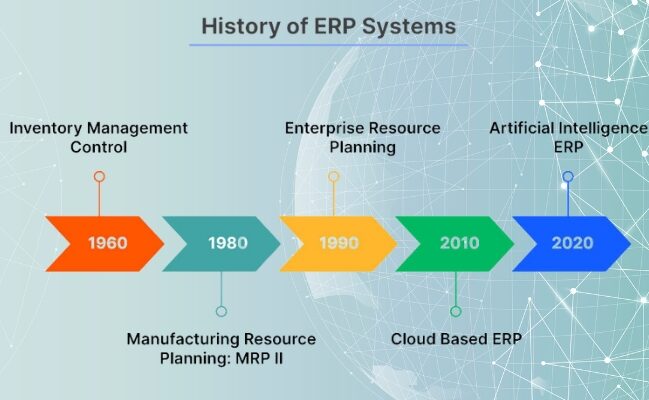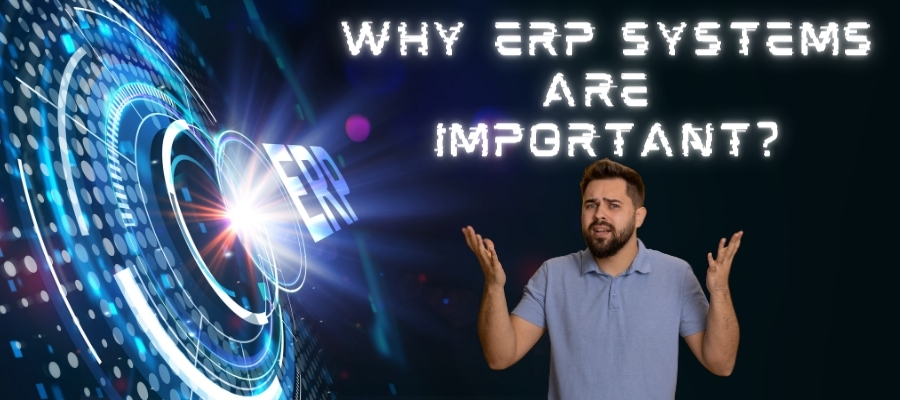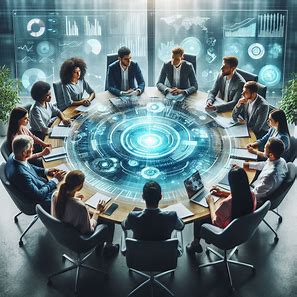
In today’s dynamic business landscape, agility and efficiency are paramount to success. Enterprise resource planning (ERP) systems, also known as ERP software, have long been a cornerstone of achieving these goals, acting as the central nervous system for a company’s operations. But just like the businesses they serve, ERP is constantly evolving, fueled by the relentless march of technological innovation.
This blog delves into the exciting world of ERP evolution, exploring how emerging technologies are transforming the way companies operate. We’ll uncover how these advancements are pushing the boundaries of what’s possible with ERP systems, ultimately empowering businesses to make smarter decisions, streamline processes using various ERP modules, and gain a significant competitive edge.
From Siloed Systems to Seamless Integration: A Look Back at Enterprise Resource Planning 's Legacy
The early days of ERP, dating back to the 1990s, were marked by a need to overcome the inefficiencies of disparate departmental systems. These isolated solutions created data silos, hindering communication and making it difficult to get a holistic view of the organization.
ERP emerged as a game-changer, integrating core functions like finance, human resources, and supply chain management into a unified platform. This centralized approach provided real-time data visibility across the enterprise, enabling departments to collaborate more effectively and make informed decisions based on a single source of truth.
The evolution of ERP systems: A Historical Perspective
Understanding the history of ERP helps us appreciate the remarkable advancements made. Early ERP systems were often complex and expensive, primarily used by large enterprises. However, the increasing affordability and accessibility of cloud-based solutions have made best enterprise resource planning software more attainable for businesses of all sizes.

The evolution of ERP can be broadly categorized into three phases:
- On-premise ERP (1960s-1990s): Early ERP systems were complex and expensive, requiring significant IT infrastructure investment.
- Client-Server ERP (1990s-2000s): This era saw the rise of client-server architecture, making ERP systems more accessible to a wider range of businesses.
- Cloud-based ERP (2000s-Present): The advent of cloud computing revolutionized ERP by offering scalable, affordable, and accessible solutions.
Why ERP Systems are Important?


Improved operational efficiency
Streamlined workflows, automated tasks, and real-time data access lead to increased productivity and reduced costs.

Enhanced decision-making
A single source of truth empowers data-driven decision-making across all departments.

Greater visibility and control
Businesses gain a holistic view of their operations, enabling better resource allocation and improved risk management.

Improved customer service
Streamlined processes and real-time data ensure faster order fulfillment and better customer experiences.
The Future of ERP Systems
As these emerging technologies continue to evolve, the future of enterprise resource planning systems looks promising. We can anticipate several key trends shaping the next generation of ERP:

Hyper-Automation
The combination of AI, ML, and robotic process automation (RPA) will drive hyper-automation in ERP systems, automating more complex and repetitive tasks, and allowing human workers to focus on strategic initiatives.

Advanced Analytics & BI
Enhanced analytics and business intelligence (BI) capabilities will provide deeper insights into business operations, enabling more accurate forecasting, trend analysis, and performance monitoring.

AR and VR
AR and VR technologies will find their way into ERPs, especially in fields like manufacturing and training, offering immersive experiences and real-time assistance.

Focus on Cybersecurity
As ERP systems become more interconnected and data-driven, the importance of robust cybersecurity measures will grow, ensuring the protection of sensitive information and maintaining trust.
Conclusion
The evolution of enterprise resource planning systems, driven by emerging technologies, is transforming business operations in ways previously unimaginable. From AI and ML to IoT, blockchain, and cloud computing, these technologies are enhancing the capabilities of ERPs modules , making them more intelligent, flexible, and user-friendly. As businesses continue to adapt to the digital age, the role of ERP systems will become increasingly vital, not just as a tool for managing resources but as a strategic enabler of innovation and growth. The future of ERP is bright, promising a new era of efficiency, insight, and competitive advantage for businesses worldwide.